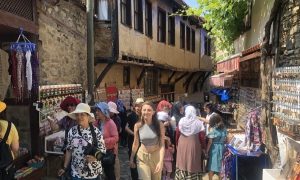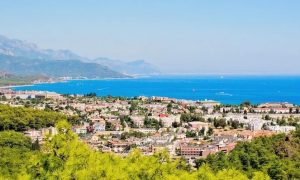In recent years, Turkey, with its unique geographical location, low cost of living, pleasant climate, and relatively relaxedimmigrantspolicy, which has attracted more and more expatriates to settle in the country. However, for programsImmigration to TurkeyThere is no greater concern for the people of the Real cost of living, employment, and social benefits. This article will provide you with a comprehensive analysis of immigrant life in Turkey, taking into account the real experiences of expatriates.
I. Analysis of the real cost of living in Turkey
Compared to Europe and the United States, the cost of living in Turkey is relatively low, especially when it comes to food, transportation and rent. Below areImmigration to TurkeySome of the key expenditures in the post
1. Housing costs
While purchasing a home in Turkey is one of the main ways to obtain residency status, renting is also an option for many expats.
✅ Istanbul City Center Apartments (1 bedroom):: Approximate US$ 500-1000/month
✅ Apartments (1 bedroom) in Ankara, Izmir and other major cities:: Approximate $300-700/month
✅ Rent in small cities or villages:: Approximate $150-400/month
✅ Purchase of property for investment (Istanbul city center): approx. per square meter $2,500-$5,000
real case::
Anna from France rented an apartment in Istanbul and said, "Compared to Paris, rents are much cheaper here, but it's important to note that prices vary a lot from one area to another. I chose the Taksim neighborhood, which has higher rents but is convenient to live in."
2. Catering and food costs
Food prices in Turkey are relatively low, especially for locally produced ingredients, while foreign and imported food is relatively expensive.
✅ Daily supermarket shopping (single person per month):: Approximate $200-$400
✅ Cafeteria dining (general dining room):: Approximate 5-10 dollars/meal
✅ Dining in fine restaurants:: Approximate $30-$50/meal
real case::
Raj from India said, "If you buy ingredients at the supermarket and cook your own meals, it will cost you about 200 dollars a month. If you eat out a lot, especially to foreign restaurants, the cost will be much higher."
3. Transportation costs
Public transportation in Turkey is very cheap for daily commuting.
✅ Monthly subway/bus pass:: Approximate $30-$50
✅ starting price for a cab:: Approximate 1 dollar
✅ oil (petroleum) price:: Approximate 1.2-1.5 US$/litre
real case::
Mark from the UK said, "Public transportation is good value, especially in Istanbul with its well-developed metro and bus system, where a single ticket costs less than $1."
4. Medical care and insurance
Turkey has a quality healthcare system and expats can choose between private health insurance or state health insurance (SGK).
✅ Private health insurance: Approximately $300-$1000
✅ Attendance at public hospitals: Low cost but long queues
✅ Private hospital visits: Higher costs but quality service
real case::
Lisa from Germany shared, "Healthcare in public hospitals is cheaper but the queues are long, so I chose private health insurance, which costs about $600 per year but makes it much easier to see a doctor."
II. Employment opportunities and income levels in Turkey
1. Types of work suitable for foreigners
Although the job market in Turkey is highly competitive, there are still some sectors that are open to expatriates:
✅ English Teacher(International schools, language institutions)
✅ technology sector(IT, Software Engineer, Data Analyst)
✅ Tourism & Hospitality(Guided tours, hotel management)
✅ Working for a multinational company(marketing, management, trade)
✅ freelancer(digital nomads, teleworking)
2. Wage levels
Salary levels in Turkey are low compared to those in Europe and the United States, but there is a great deal of variation in salary levels for different positions.
✅ English Teacher:: Approximate $800-$2,000/month
✅ IT industry:: Approximate $1500-4000/month
✅ Tourism & Hospitality:: Approximate $800-$1500/month
✅ General office work:: Approximate $600-$1500/month

real case::
Tom from the United States, who works for an IT company in Istanbul, said, "Although the salary is not as good as Silicon Valley, the cost of living is much lower, so overall life is less stressful."
III. Social Welfare System in Turkey
Turkey has a developing social welfare system, which is not as good as that of developed countries in Europe and the United States, but there are certain guarantees for expatriate residents.
1. Medical benefits
Foreigners with Turkish residency status can choose toEnrollment in State health insurance (SGK)The Government of the Republic of Korea has also been providing health care services at a lower cost to the public.
✅ SGK health insurance costs: Approximately $100(covering family members)
✅ Low cost but long queuing time for public hospital visits
2. Educational system
✅ Public schools are free, but Turkish is mainly used
✅ **Private international schools cost approx. $5,000-15,000/yearSuitable for expatriate children

3. Retirement benefits
If an expatriate works and pays social security in Turkey, he or she can retire and receivepensionsBut it usually takesAt least 10-15 years of social security payment recordThe
Four,Turkish immigrantsReal-life experiences: advice for expats adjusting to life
1️⃣ Learning Basic Turkish: Although there are many English speakers in big cities, learning some Turkish can make life easier.
2️⃣ Choosing the right city to live in: Istanbul for those with lots of job opportunities, Antalya for those who like to live on vacation, and smaller cities for those with a low cost of living.
3️⃣ Planning ahead for health insurance: Ensure that you have medical coverage to avoid high costs in case of an emergency.
4️⃣ Finding the right social circle: Meet people and integrate into local life through social media and international communities.
V. Conclusion:Turkish immigrantsIs it for you?
Turkey has a low cost of living and a pleasant climate for those wishing toReduce cost of living, enjoy a livable environment, invest in real estate or work remotelyof people. However, wage levels in Turkey are relatively low and language can be a challenge, so for theWell-funded and adaptable, here is a good choice.
If you are consideringImmigration to TurkeyIt is recommended to do this well in advanceBudget planning, choosing the right type of immigrationand throughreal experienceUnderstand the local living patterns to ensure that your path to immigration is smoother!






